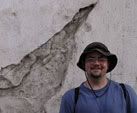Friday, March 25, 2005
DATELINE: Friday, March 25, 2005
UNLAXATION DAY 1
I wanted to sleep all the way `til 9, but found myself wide awake at 7:30. I don’t know if I was just restless or if I was just too cold from the double blast of air-conditioning, but I was awake. It had actually been quite blissful to sleep so cold, but after a few hours my body had cooled down and I was forced to retreat beneath the thin blanket I’d been using as stuffing for my pillow-case. So at 7:30 I got up and grabbed my camera and headed outside to see if I could find cool stuff to take pictures of.
I decided I needed a photographic mission for the morning and that mission was to photograph a snake. So far on the journey, we’d seen a few hefty bugs and one of the guys said he’d even seen a little scorpion in one of the bano stalls, but so far I’d not seen anything fangy and dangerous. I thought it would be great to find a picture of a snake, if only to show the image to my ophiciophobic wife, (that means "skeered of snakes", for those of us in West Virginia). Ash had been a bit worried about snakes throughout our trip. Someone had told her that the most deadly snake in the country is a tiny little snake that likes to hide under leaves and brush and then viciously bite anyone who accidentally steps on it. Most of the camp was red dirt, though, so we weren't too worried about leaves.
I walked from my bunk-house onto a clear path that ran through the rocks and shrubs on the side of the tallest hill at the camp. I kept my eyes peeled for snakes, figuring if they were on the path I'd see them. After more walking I found that my path indeed began to run underneath a long stretch of leaves and brush. I was wearing shorts and flip-flops--not exactly snake-proof gear--but I still didn’t want to wuss out and turn back. So I began carefully making my way through the leaves, trying to step on as many rocks as possible. When I was in the very middle of the leaf section, some birds that had been hiding in a nearby bush suddenly flushed out, frightening me nigh unto requiring a clean pair of drawers. Still no snake.
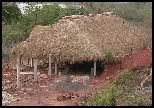 The path eventually lead down the hill onto a dirt road that ran back toward an open-air structure with a palm-frond roof as well as a second site that was only a foundation for a similar structure. We were to learn later that this will be the new dining hall and kitchen for the camp. The camp itself will be used primarily as a summer-camp for kids and several more bunk-houses and shower facilities will soon be built to help accommodate more kids, in addition to the new kitchen and dining hall. This place is impressive enough now, but it’s going to be even better once Marcello has a few more buildings.
The path eventually lead down the hill onto a dirt road that ran back toward an open-air structure with a palm-frond roof as well as a second site that was only a foundation for a similar structure. We were to learn later that this will be the new dining hall and kitchen for the camp. The camp itself will be used primarily as a summer-camp for kids and several more bunk-houses and shower facilities will soon be built to help accommodate more kids, in addition to the new kitchen and dining hall. This place is impressive enough now, but it’s going to be even better once Marcello has a few more buildings.Dr. Allen was up for a morning stroll and he and I walked along the dirt road that curved around the bottom of the biggest hill chatting about our week. I like Dr. Allen and Mary Ann a whole lot. Ashley had done two medical rotations at Dr. Allen's clinic--her first one and her third from last, which she was technically continuing on this mission. She had been saying how great to work with he and Mary Ann were for months, but I'd not met either of them until we attended the wedding of his daughter in February. I was glad to have gotten to know them both on this mission. And I haven't written nearly enough about how great Mary Ann was in the pharmacy. We sometimes get under each others feet, and I've no doubt that our methods often clash, but in such cases I always tried to remember that between the two of us she is far far far more likely to know what she's talking about, being a nurse and all, so I should always defer to her judgement
We continued along the road until it intersected with a very steep road that lead to the top of the hill. We parted ways there, for due to his bad knees he wasn’t keen on walking up that hill just yet.
 Near the top of the hill were rows and rows of logs that had been laid down to provide seating for a massive campfire pit. This is where future campers would settle at the end of their day to sing around the campfire. Further up from there at the actual top of the hill I could see a fantastic view of the entire camp property. After gazing around at the lake and surrounding camp buildings below me, I went to take a look at the zip-line.
Near the top of the hill were rows and rows of logs that had been laid down to provide seating for a massive campfire pit. This is where future campers would settle at the end of their day to sing around the campfire. Further up from there at the actual top of the hill I could see a fantastic view of the entire camp property. After gazing around at the lake and surrounding camp buildings below me, I went to take a look at the zip-line.The zip-line was a thick metal cable that was stretched between a large concrete anchor on that hill to another one on the next hill over. This was a device that would allow a fully harnessed up person to "zip" along the wire on pulleys, high above the ground, moving from one hill to the other very quickly. The pulleys and rigs weren’t attached yet, but we’d been told we’d be able to play on the zip-line on Saturday. The line itself was pretty far above the ground, but I was already looking forward to trying it out.
I took a few pictures of the camp up there, but I never found a snake.
I ate breakfast with Esdras that morning, talking more about his education plans and his concerns about seminary. Mid-way through our chat, there came a tremendous crie from the far side of the dining pavillion. A group of the translators and missionaries were hoisting the youngest member of the mission/translator staff, Kevin Herrera, over their shoulders and into the air.
I haven't written about Kevin before because our paths didn't cross a lot during the course of our mission work. However, he was kind of the adopted mascott of camp. Kevin was probably 14 years old, but a fairly fluent English speaker. He was a very outgoing kid, always smiling, always happy and often playing practical jokes on anyone and everyone. During one day in Pasaco, Kevin offered me a piece of chewing gum. I chewed it to find that it was packed full of some kind of intense flavor crystals that made it at least twice as powerful as an Altoid mint. Kevin was expecting some sort of extreme reaction from me and was very disappointed when I turned out to like the gum.
"Where did you get it?" I asked.
"Oh, the store," he said.
"What's it called again? I've got to get some of that to take home."
He later tried the same trick on Ashley, with very similar results. Other team members, however, weren't so immune to the powerful gum and Kevin became known as a trickster.
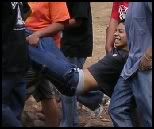 I still don't know what Kevin did to provoke his fellow translators and missionaries, but it must have been something worthy of collective revenge. We watched watched as the group of locals hoisted Kevin above their heads then lowered him to carry by each of his limbs as they took him away from the pavillion and down the hill. This could only mean one thing: Kev was getting dumped in the lake.
I still don't know what Kevin did to provoke his fellow translators and missionaries, but it must have been something worthy of collective revenge. We watched watched as the group of locals hoisted Kevin above their heads then lowered him to carry by each of his limbs as they took him away from the pavillion and down the hill. This could only mean one thing: Kev was getting dumped in the lake.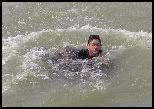 Esdras and I shot up from our seats and ran to follow. I ran down the hill, trying to get my camera out of its bag and trying not to collide with Andrew, who was also sprinting through the rocks and brush trying to get ahead of the Kevin-carrying revenge squad. I'm amazed we didn't break something vital in our dash down the hill, but we did get ahead of them. They carried Kevin down onto the small dock, thoughtfully removed his shoes for him, then heaved him back and forth a few times and then let him fly. Kevin splashed down in the four foot deep water. He came up grinning, but soon started splashing everyone on the dock with the now muddy water. His tormentors, satisfied that they had meted out justice for the day, retreated back to their breakfasts leaving the rest of us to stay around and take pictures of the soaked lad. The lake bottom is nothing but mud and silt, so Kevin's formerly white socks were now deep black.
Esdras and I shot up from our seats and ran to follow. I ran down the hill, trying to get my camera out of its bag and trying not to collide with Andrew, who was also sprinting through the rocks and brush trying to get ahead of the Kevin-carrying revenge squad. I'm amazed we didn't break something vital in our dash down the hill, but we did get ahead of them. They carried Kevin down onto the small dock, thoughtfully removed his shoes for him, then heaved him back and forth a few times and then let him fly. Kevin splashed down in the four foot deep water. He came up grinning, but soon started splashing everyone on the dock with the now muddy water. His tormentors, satisfied that they had meted out justice for the day, retreated back to their breakfasts leaving the rest of us to stay around and take pictures of the soaked lad. The lake bottom is nothing but mud and silt, so Kevin's formerly white socks were now deep black.After breakfast, we said our last goodbyes to the members of the local team who were departing for Guatemala City. Our departure wasn’t far behind.
Throughout the week, I had noticed a disturbing pattern with our medical team and with myself, which repeated itself Friday morning. Whenever it came time to go anywhere by bus, the whole lot of us would climb the hill at camp to where the busses were parked, board the busses and then sit in them sweating like pigs in a sauna as the last few stragglers finally made their way up the hill to board as well. We could have just waited outside, where it was still hot but not sauna hot. But noooo, every single time we all climbed on the bus and sweated and muttered about the slow people holding us up and how we wished we could get on the road so we could get some wind on us and how next time we should just wait outside. Every. Single. Time. And medical personnel are supposed to be smart.
Our trip to Antigua was in the full-sized bus, the one with all of its seats, but there was still not enough room for everyone. (We found this out only after everyone had piled on the hot bus like morons YET AGAIN. What is it about such hot weather that makes otherwise intelligent people, myself included, pile into a giant tin can in 120 degree heat, repeatedly?) In order to create more seating, one of the pavilion benches was brought in and slid down the bus aisle. It was a tight fit for everyone.
Ashley nearly stayed behind for the day, because she was feeling ill and the heat was really getting to her. Once the bus was under way, though, the air-circulation cooled us off quite a bit and she began to feel better.
Most of the team had changed out around $50 in U.S. currency for the equivalent in quetzals, the Guatemalan currency. Due to an exchange rate of about 7 quetzals for every dollar, we felt like truly wealthy people. Unfortunately, Antigua is not only famous for it’s Holy Week festivities but also for its pickpockets. We were also warned to keep all wallets and important papers in front pockets and to keep a sharp eye out for trouble and not to leave anything on the bus, because thieves were likely to come onto the bus while we were gone.
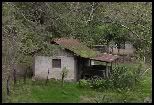 The drive to Antigua was nearly as long than that back to Guatemala City. Antigua is to the south-west of G-City. We were therefore able to skirt around G-City and on into Antigua.
The drive to Antigua was nearly as long than that back to Guatemala City. Antigua is to the south-west of G-City. We were therefore able to skirt around G-City and on into Antigua.Oswald drove us. Every time he got behind the wheel, he proved to us just how fantastic a driver he is. Driving a school bus in Central America isn’t as easy as in the states. Most of the streets in these smaller towns are very narrow and difficult to maneuver in a car, let alone a big white bus. Even when hurtling the wrong way down one-way streets with lots of tight corners, Oswald had it under control.
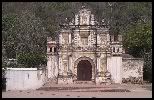 We didn’t have nearly as much trouble getting into Antigua as had been predicted. We were able to drive right up to the edge of the down town proper, passing fantastic ancient churches and ruins along the way. There was a line of parked busses that we had to go by in order to get to the edge of the down-town area. Once there, Oswald stopped to let us out, the plan being for him to find a place to park the bus and catch up with us later. Rick and Butch told us that we would soon be splitting into smaller groups each with a translator, but first there were a couple of places of interest that they wanted to show us. After that, we were free to go.
We didn’t have nearly as much trouble getting into Antigua as had been predicted. We were able to drive right up to the edge of the down town proper, passing fantastic ancient churches and ruins along the way. There was a line of parked busses that we had to go by in order to get to the edge of the down-town area. Once there, Oswald stopped to let us out, the plan being for him to find a place to park the bus and catch up with us later. Rick and Butch told us that we would soon be splitting into smaller groups each with a translator, but first there were a couple of places of interest that they wanted to show us. After that, we were free to go.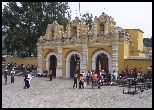 The first thing I need to say about Antigua--the first thing we really noticed upon departing our bus--is that the climate was FANTASTIC! It was still warm, of course, but probably in the low to mid-80s. It was also not at all humid and there was a constant light breeze blowing that made it perfectly comfortable. I'd somehow been expecting a sweat-fest, but should have known that since we had returned to higher elevation it would be nice. This comfort put us all in great spirits and got the unlaxation off to a proper start.
The first thing I need to say about Antigua--the first thing we really noticed upon departing our bus--is that the climate was FANTASTIC! It was still warm, of course, but probably in the low to mid-80s. It was also not at all humid and there was a constant light breeze blowing that made it perfectly comfortable. I'd somehow been expecting a sweat-fest, but should have known that since we had returned to higher elevation it would be nice. This comfort put us all in great spirits and got the unlaxation off to a proper start.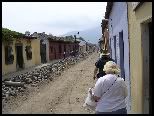 We walked down from the bus into the town itself, following Butch, where we soon found ourselves hanging a left onto an unpaved street. The street looked as though its paving had been dug up at some point in the recent past in preparation for repaving. As a result, the narrow sidewalks were often over a foot and a half above the street itself.
We walked down from the bus into the town itself, following Butch, where we soon found ourselves hanging a left onto an unpaved street. The street looked as though its paving had been dug up at some point in the recent past in preparation for repaving. As a result, the narrow sidewalks were often over a foot and a half above the street itself.Our first stop of interest was a beautiful hotel. To enter it you had to cut through a cluster of street-peddlers who were camped out at its entrance awaiting the tourists who came and went. They attempted to sell us beads, trinkets, reed flutes and tapestries until we were able to get through them and into the hotel. Once inside, we found ourselves on a wide stone walk that ran along a lush and fountain-studded open air garden that lead to the hotel's mostly open air lobby. When I say mostly open air, I mean that the front desk, while covered by a roof, was still exposed to the air from the open garden that it bordered. The desk itself was an ancient-looking carved wood structure that most of us deemed "awesome" in true American fashion.
We walked through the garden, taking photos of each other with the enormous parrots that hung from perches there, or with the various art exhibits on display.
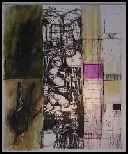 Further past the lobby was an alcove art gallery with some of the most disturbing art I've seen in a while. I only took pictures of one of them because I was a little scared of seeing any more of them pop up during one of Butch's slide shows. I was not as afraid of some of the sculpture on display in the lobby, though. Across from the alcove was a lovely restaurant that had both a covered area and an outdoor patio area side by side. We went out to the patio area that was not a part of the restaurant itself and walked around enjoying the atmosphere and looking at the wares of the ladies who were
Further past the lobby was an alcove art gallery with some of the most disturbing art I've seen in a while. I only took pictures of one of them because I was a little scared of seeing any more of them pop up during one of Butch's slide shows. I was not as afraid of some of the sculpture on display in the lobby, though. Across from the alcove was a lovely restaurant that had both a covered area and an outdoor patio area side by side. We went out to the patio area that was not a part of the restaurant itself and walked around enjoying the atmosphere and looking at the wares of the ladies who were 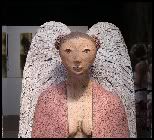 selling Guatemalan souvenirs. They had some marvelous things, such as knitted hats and bags, jewelry, masks and crafts of all sorts, plus the standard assortment of beads, trinkets, reed flutes and tapestries. As we looked, though, some of our interpreters came up and slyly told us not to buy anything there because the prices were quite inflated compared to the Indian Markets further into Antigua itself. We kept our quetzals in our pockets.
selling Guatemalan souvenirs. They had some marvelous things, such as knitted hats and bags, jewelry, masks and crafts of all sorts, plus the standard assortment of beads, trinkets, reed flutes and tapestries. As we looked, though, some of our interpreters came up and slyly told us not to buy anything there because the prices were quite inflated compared to the Indian Markets further into Antigua itself. We kept our quetzals in our pockets.After a lengthy headcount to make sure we were all still there, we back out to the street where we practically had to fight our way through the peddlers gathered at the entrance with their beads, trinkets, reed flutes and tapestries. We then followed missionary extraordinaire Marcello Hounko (no relation to Marcello Diez) as he lead us back along the unpaved street and a few blocks further into the city. As we went, more peddlers came up with more beads, trinkets, reed flutes and tapestries but I think we all steadfastly refused.
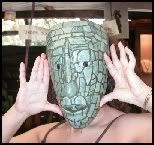 Marcello H. led us to a genuine Guatemalan Jade factory, which turns out to be one of the only officially sanctioned ones in that part of the world. The factory is where mined jade is brought and shaped with diamond instruments and grinders, fashioned into a wide variety of objects that are then shipped around the world. The factory itself was not in operation that day due to the holidays but we were given a tour of the area and shown some beautiful examples of the kind of thing they do there and told a bit of the history of Jade itself in Central America.
Marcello H. led us to a genuine Guatemalan Jade factory, which turns out to be one of the only officially sanctioned ones in that part of the world. The factory is where mined jade is brought and shaped with diamond instruments and grinders, fashioned into a wide variety of objects that are then shipped around the world. The factory itself was not in operation that day due to the holidays but we were given a tour of the area and shown some beautiful examples of the kind of thing they do there and told a bit of the history of Jade itself in Central America.After the tour, we retired to the gift shop where we were served complimentary locally grown coffee in little stoneware cups that we could keep. They also gave us little knitted rainbow colored drawstring pouches on a string necklace that contained a small doll. This is a traditional Guatemalan gift to bring good luck. I went ahead and put mine on. I didn't know it at the time, but the pouch, if not the doll within, would become my dearest friend in the coming days.
Upon leaving the Jade factory, we were set free to do what we wanted. It was around 3:30 at that point, so we agreed to meet back at the bus area at 5:30. Beyond that we could go off on our own or in groups and there were enough translators to go around for small groups. Ash and I decided it would best to stick close to a group of folks, so we tagged along with a few people to explore the ancient streets. We had to keep repeating the phrase "No gracias!" over and over as wave upon wave of more peddlars came at us.
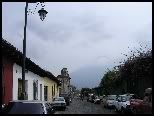 The streets and architecture of Antigua were amazing to see, particularly with the volcano jutting up from the horizon, looming over us despite being quite a distance away. I don't think I've ever been to some place with such ancient structures. Probably the closest I've come was St. Augustine, FL, the oldest city in America (take THAT Boston!).
The streets and architecture of Antigua were amazing to see, particularly with the volcano jutting up from the horizon, looming over us despite being quite a distance away. I don't think I've ever been to some place with such ancient structures. Probably the closest I've come was St. Augustine, FL, the oldest city in America (take THAT Boston!).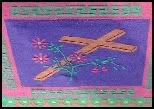 As you might expect at the pinnacle of Holy Week festivities, Antigua was quite crowded. No, really. There were just loads and loads and loads of people, beyond the peddlars. And not only Guatemalans but a wide variety of other nationalities as well. The Guatemalans themselves are a beautiful people, but there were some other incredible-looking people from all over the world there as well. As a writer, I found myself wondering about their backgrounds and reasons for coming to Antigua on this day, (though they were all probably pretty similar, considering the main draw was the holy week festivities).
As you might expect at the pinnacle of Holy Week festivities, Antigua was quite crowded. No, really. There were just loads and loads and loads of people, beyond the peddlars. And not only Guatemalans but a wide variety of other nationalities as well. The Guatemalans themselves are a beautiful people, but there were some other incredible-looking people from all over the world there as well. As a writer, I found myself wondering about their backgrounds and reasons for coming to Antigua on this day, (though they were all probably pretty similar, considering the main draw was the holy week festivities).Occasionally, we would see a shop we wanted to stop in and would do so. I was looking out for interesting masks, as I seem to have collected a few from around the world and thought it might be nice to pick one up. But it couldn't just be any mask. It had to be something that just jumped out and said, Oh, hey, I'm the mask for you. I didn't find it in the tiny mask shop we visited, though, so we moved on.
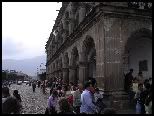 The street we were walking down eventually opened onto Antigua's main square, an enormous area surrounded by more ancient and beautiful buildings, with peddlers and rolling snack carts every few feet. There was more room to walk around here, but there were also more people to fill up that room. I found the experience kind of overwhelming to view. You couldn't look at everything and everyone, but there was so much going on around you that you wanted to look at. It kind of pressed emotional buttons within me, and I know it did with Ashley because she was tearing up too.
The street we were walking down eventually opened onto Antigua's main square, an enormous area surrounded by more ancient and beautiful buildings, with peddlers and rolling snack carts every few feet. There was more room to walk around here, but there were also more people to fill up that room. I found the experience kind of overwhelming to view. You couldn't look at everything and everyone, but there was so much going on around you that you wanted to look at. It kind of pressed emotional buttons within me, and I know it did with Ashley because she was tearing up too.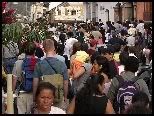 We continued along the street, leaving the square and traveling on. Our main road eventually intersected a four-lane road system that was lined with more snack carts and little temporary cocinas selling what smelled like tasty but potentially stomach-churning food. We looked things over there, but kept moving lest temptation to destroy our GI tract become too great.
We continued along the street, leaving the square and traveling on. Our main road eventually intersected a four-lane road system that was lined with more snack carts and little temporary cocinas selling what smelled like tasty but potentially stomach-churning food. We looked things over there, but kept moving lest temptation to destroy our GI tract become too great.Soon we came to a row of covered booth shops that sold all manner of souvenir items--mostly T-shirts, dresses, masks, hats, colorful knitted clothing, bright bags and the usual assortment of necklaces, trinkets and reed flutes. Some of our crew were already there shopping, including Dr. Allen and Mary Ann. Mary Ann had bought a bright red knitted bag and was transferring the contents of her pack into it. I noticed again that Dr. Allen was wearing his passport wallet on the outside of his clothing. This seemed a little unwise to me, as I thought those things were meant to be worn beneath your clothes or at least snugly in a pocket. My own I'd put in my velcro closed back pocket, but I'd already removed all of my money from it so that I didn't have to keep taking it out and calling attention to it. My theory was that pickpockets watch to see which pockets you keep checking and use that as a tell to which pockets they should pick.
We shopped a bit among the items being offered at the booth shops. The ladies that ran the shops didn't speak much English, but knew a few phrases which they repeated over and over. "Buy for Mama. Buy for my seester. Buy for Mama."
We didn't wind up buying anything at those shops, but the same rules applied at the Indian Market, which was only a little way further down the road.
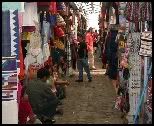 The Indian Market was a cluster of permanent cubbyhole shops, each of which were roofed but which had open air aisles between them, covered by a translucent roof above that. We only thought we'd had trouble with the street peddlers earlier, because a walk through the Indian Market meant a constant attack by aggressive salespeople who didn't want to accept "No Gracias" for an answer. We had been told by our translators to never pay the asking price for any given item because the shopkeepers expect you to haggle with them and are more than willing to give you a better deal if you do so. The rule of thumb was to try and pay no more than half of the original asking price. However, I found the best way to haggle was to pick up an item, decide you were truly uninterested in it and try to walk away. Then the shopkeepers couldn't lower their prices fast enough and would do all your haggling for you. We wound up purchasing things out of sheer shopper's guilt at passing up such terrific bargains. And the more disinterested you tried to act, the lower the price went. We didn't haggle so much as we succumbed to guilt over turning down such terrific bargains. This was, of course, their plan all along.
The Indian Market was a cluster of permanent cubbyhole shops, each of which were roofed but which had open air aisles between them, covered by a translucent roof above that. We only thought we'd had trouble with the street peddlers earlier, because a walk through the Indian Market meant a constant attack by aggressive salespeople who didn't want to accept "No Gracias" for an answer. We had been told by our translators to never pay the asking price for any given item because the shopkeepers expect you to haggle with them and are more than willing to give you a better deal if you do so. The rule of thumb was to try and pay no more than half of the original asking price. However, I found the best way to haggle was to pick up an item, decide you were truly uninterested in it and try to walk away. Then the shopkeepers couldn't lower their prices fast enough and would do all your haggling for you. We wound up purchasing things out of sheer shopper's guilt at passing up such terrific bargains. And the more disinterested you tried to act, the lower the price went. We didn't haggle so much as we succumbed to guilt over turning down such terrific bargains. This was, of course, their plan all along.We found some nice souvenirs to bring home to folks. I found five colorful sun-face ceramic ornaments for the library staff. I actually did try haggling over them, but when I did the calculations, hours later, I was really lowballing my bid and the shopkeeper that sold them to me had every reason to turn down my offer and stick to her guns. I still got away for a steal.
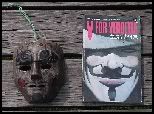 Ash found a pair of jade earrings at another shop and I finally found a wooden mask that I liked. At first, I thought it was because the mask looked very similar to the title character's Guy Fawkes mask in the Alan Moore/David Lloyd comic series V for Vendetta. Later, I realized it also looked quite a bit like me, with its thick eyebrows, goatee and rosy cheeks.
Ash found a pair of jade earrings at another shop and I finally found a wooden mask that I liked. At first, I thought it was because the mask looked very similar to the title character's Guy Fawkes mask in the Alan Moore/David Lloyd comic series V for Vendetta. Later, I realized it also looked quite a bit like me, with its thick eyebrows, goatee and rosy cheeks.It was 5:15 by the time we decided to head back toward the bus. We should have felt guilty for starting back so late, but we didn't worry about it as mission leader Rick Brooks was right there at the market with us and was therefore exactly as late as we were.
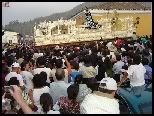 We started back down the road passing the previous shops and food vendors and on through the main square. We had nearly made it as far as the jade factory when foot traffic came to a sudden halt at an intersection. Passing through the intersection was the last of the Holy Week processionals. This is one of the major features of Holy Week in which citizens pay big money for the privilege of carrying elaborately carved and incredibly heavy "float" through the streets of the city. These floats depict different aspects of the death of Christ in traditional elaborate Catholic fashion. The float-carriers themselves are elaborately garbed as well and take the float in shifts winding throughout the streets of Antigua.
We started back down the road passing the previous shops and food vendors and on through the main square. We had nearly made it as far as the jade factory when foot traffic came to a sudden halt at an intersection. Passing through the intersection was the last of the Holy Week processionals. This is one of the major features of Holy Week in which citizens pay big money for the privilege of carrying elaborately carved and incredibly heavy "float" through the streets of the city. These floats depict different aspects of the death of Christ in traditional elaborate Catholic fashion. The float-carriers themselves are elaborately garbed as well and take the float in shifts winding throughout the streets of Antigua.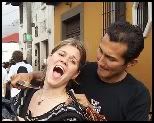 If we had been just a little bit quicker, we probably could have made it through the intersection. Instead, everyone stopped and watched as floats depicting the burial and resurrection of Christ were carried through. Soon, all the foot traffic that had been behind us reached the place where we stood and the group of us suddenly found ourselves squished up against one another and against the other members of the crowd in a most tight fashion. This was when my paranoia went into overdrive, because it was an atmosphere in which I imagined pickpockets would be lurking. I shouldn't really have worried about pickpockets in the standing crowd, though, because no one could really move anyway. But after 10 minutes or so, the slow procession had passed by and foot traffic began moving again and suddenly we found ourselves in chaos.
If we had been just a little bit quicker, we probably could have made it through the intersection. Instead, everyone stopped and watched as floats depicting the burial and resurrection of Christ were carried through. Soon, all the foot traffic that had been behind us reached the place where we stood and the group of us suddenly found ourselves squished up against one another and against the other members of the crowd in a most tight fashion. This was when my paranoia went into overdrive, because it was an atmosphere in which I imagined pickpockets would be lurking. I shouldn't really have worried about pickpockets in the standing crowd, though, because no one could really move anyway. But after 10 minutes or so, the slow procession had passed by and foot traffic began moving again and suddenly we found ourselves in chaos.I likened it to being trapped in a busy high school hallway, jostled on every side by moving humanity all trying to go in opposing directions. I found myself trying to keep paths clear for the people around me, some of whom were elderly, while at the same time still trying to keep up with Ashley and the rest of the group. This, we believe, was when the pickpockets really struck, though none of us knew that anyone's pocket had been picked until we had walked all the way back to our rendezvous point.
"Do you have all of your belongings?" Astrid asked me as we waited for the bus to come.
"Yeah," I said, patting my back pocket where my passport wallet was. It was there.
"Are you sure?" she asked. "Have you checked everything?"
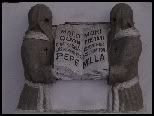 That's when I learned that some of us had not made it with all our things. Dr. Allen had arrived at the rendezvous point, looked down to check his passport wallet and found he only had its straps hanging around his neck. His passport, credit cards and a good supply of cash had been in it. Similarly, his wife Mary Ann found that the bottom of her new bag had been slashed, leaving a nice sized hole in it. She had been carrying Dr. Allen's PADA, which was now missing. Sandra Waddell soon noticed that her bag had been slashed and her wallet taken, though she did still have her passport. Everyone was then asked to check his or her personal items to make sure we still had everything.
That's when I learned that some of us had not made it with all our things. Dr. Allen had arrived at the rendezvous point, looked down to check his passport wallet and found he only had its straps hanging around his neck. His passport, credit cards and a good supply of cash had been in it. Similarly, his wife Mary Ann found that the bottom of her new bag had been slashed, leaving a nice sized hole in it. She had been carrying Dr. Allen's PADA, which was now missing. Sandra Waddell soon noticed that her bag had been slashed and her wallet taken, though she did still have her passport. Everyone was then asked to check his or her personal items to make sure we still had everything.I was kind of amazed that I did, being as how my cheap backpack has open pockets in the back and hangs low enough on my back that anyone could have looked in or even reached in and I would never have known. Granted, I only had Nutter Butters and a couple of camera wires in there, so maybe no one found anything they wanted.
Butch later told us that upon hearing of Dr. Allen's missing passport wallet, he started to say, "How could anyone be dumb enough to get their passport stolen," when he reached down and realized his PDA was also missing. It had been in a buttoned cargo pocket, but the thieves had seen no difficulties in gaining access.
In order for Dr. Allen to get his passport replaced, Butch knew they would have to file a police report as soon as possible, so he, Dr. Allen and Marcello Hounko went to the local police station to take care of that. The rest of us piled back on our bus to sit and take stock of our experience. Many of us were angry initially that thieves had done so well off of us. Some even said that they wished they'd been able to catch the thieves in mid-theft. Then, we thought about this a bit more and realized we were probably lucky that we had not caught them. These guys were carrying blades in order to slice open bags and pockets and would likely have had no problem slicing us open if it meant getting away.
When Dr. Allen returned, he said there had been a British couple at the police station ahead of him who had been beaten up by a gang of men weilding machettes who took their bags. We frankly got off lucky.
Dinner that night was to be at a restaurant in Guatemala City. We called Marcello Diez ahead to let him know we'd be a bit later than expected due to our adventures with pickpockets. Soon after Dr. Allen returned to the bus, we hit the road.
It took about an hour to get to Guatemala City, but our first stop was actually Marcello’s house. Once there, Marcello saw how cramped the bus was and made the enticing offer that some of the people who felt especially crammed could ride in his nice air-conditioned van instead and be more comfy. There were surprisingly few takers. In retrospect, maybe some of them knew something we didn’t. Ash and I decided that if no one else was scrambling to ride in comfort, we would. Dr. Allen and Mary Ann as well as a handful of others joined us in the van.
The trip to the restaurant was just blissful, with nice cool air-conditioning blowing on us the whole way.
 We dined that evening at a Sizzler steakhouse/buffet. I was frankly glad to see it, because you know what you're getting with a Sizzler and my stomach had been feeling a bit achey through the afternoon and I was pretty sure I wasn't yet shed of my gastronomic adventures of the past few days.
We dined that evening at a Sizzler steakhouse/buffet. I was frankly glad to see it, because you know what you're getting with a Sizzler and my stomach had been feeling a bit achey through the afternoon and I was pretty sure I wasn't yet shed of my gastronomic adventures of the past few days.Several of the missionary staff and national medical personnel who lived in Guatemala City joined us there for dinner and we had a great time. We were practically the only folks in the restaurant at that time of night. My stomach ache even decided to subside during dinner, allowing me to enjoy it. However, it roared back into life immediately afterward. I won’t be gross, but I got to know the Sizzler’s bano pretty well over the course of ten minutes. It receives my vote for Best Bano Ever, due to its comfort, privacy and good music.
After finishing our meal and saying goodbyes again to some of the staff we wouldn’t be returning to camp with, we loaded up. Once again, Ash and I rode in the van, which we figured would be the comfortable way to travel back into the humidity of the lower altitudes.
How wrong we were. How horrifically wrong we were.
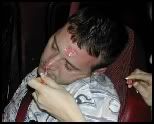 At first, things were quite nice. It was cool in the van and we kept ourselves amused by snickering quietly as Marcello's secretary defaced Butch with makeup as he snoozed in the front seat. (That's so wrong, I know, but it was funny.) It was so comfy in there that I eventually went to sleep myself.
At first, things were quite nice. It was cool in the van and we kept ourselves amused by snickering quietly as Marcello's secretary defaced Butch with makeup as he snoozed in the front seat. (That's so wrong, I know, but it was funny.) It was so comfy in there that I eventually went to sleep myself.I awoke probably 40 minutes later later in a thick sweat. At some point during the journey, Marcello had switched off the air-conditioner and it was never switched back on. Most of the windows on the van were of the variety that can only open a couple of inches and the one nearest me wouldn't stay open at all unless propped, so while we did get some air we didn’t get as much as the folks back on the bus likely were. That sounds bad enough. It might even sound like I’m complaining. No. I’m not. But I’m about to.
When I next awoke, I discovered the true reason why Marcello always tells people it will take far less time to get places than it actually does. And that reason is because you do indeed arrive at destinations far more quickly when you drive at 90 mph the entire way!
There I was, sleeping away. Then my heat-addled mind awakened me, I groggily unstuck myself from the vinyl seat-back and casually glanced out the window only to find our night-time surroundings hurtling past the van at a tremendous and most unsettling speed. Marcello was laying on the gas peddle with abandon. I couldn’t see the speedometer from my seat, but it had to be edging close to 144 kilometer/hour. There was very little other traffic on the road, but whenever we would come upon a car (rush upon some, I should say) Marcello would just zip around it and on we’d go, careening into the night. I was terrified to my core.
I really shouldn’t have been surprised, because I knew Marcello’s reputation from Ashley’s description of her terrifying journey down the side of a mountain when her mission team was leaving Quetzaltenanga, trying to get back to Guatemala City during the civil disturbances of 2003. From what I’d heard of that trip, Marcello’s current driving was actually pretty tame by comparison. And at least we weren’t flying down twisty winding one-lane mountain roads.
No one else in the van seemed too concerned by our speed. In fact, most of them seemed to be trying to sleep through it as best they could. Not a bad idea, I thought. At least if I was asleep and we died in a horrible fiery crash, I might not wake up for it at all. Plus, if we did crash at this speed, death was almost a certainty, for there were no seatbelts to be found in Marcello’s van. (At least, I never found any. In fact, working seatbelts were pretty thin on the ground for much of our stay and by our second week in Central America I'd eschewed them entirely in favor of pure faith.)
Before returning to blissful unconsciousness, I decided to hedge bets against firey death by praying to our Heavenly Father for safe travel for us and for Marcello’s driving skills to be strengthened. This would not be the last time I would have to pray for safe travel in the hands of Marcello and his van. I’m sure I was not alone in my prayers, either and I know I wasn’t the only one audibly thanking God when we finally did arrive safely back at camp.
I hit the showers as soon as I could and by the time I got out the bus had also arrived. Most of the people on it looked happy and undisturbed by their journey. They spoke of seeing lava shooting out of the top of an active volcano on their way back. I'd slept through that part, so I didn't get to see it. At least I was alive, though.
